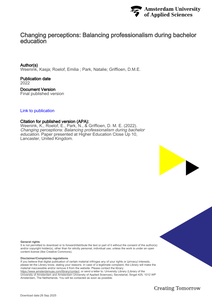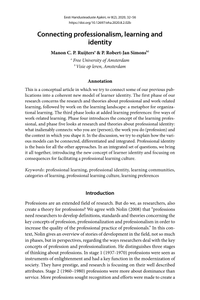In the European policies to increase the quality of teachers, much attention is given to the upgrading of qualifications. However, in European debates on teacher education, e.g. within the context of the Education & Training 2020 program, discussions about the qualification level are mostly restricted to initial teacher education. This raises the question what possibilities there are to raise the qualification level of teachers already working in schools. From this perspective, there is a need to take a closer look at in-service Master’s qualification programs, at existing arrangements and programs, at their focus and their impact on the professionalism of teachers. The paper addresses issues with respect to the conditions for successful in-service Master’s level qualification programs and reflects on content elements that should be part of the curriculum of these programs. In answering the question what content elements should be part of inservice Master’s programs that extend the minimum standards for teachers, the paper focuses on the ‘secondary role’ of teachers that extends beyond the primary process of teaching and learning and connects this to the concept of extended professionalism (Hoyle 1975, Stenhouse 1975). The paper concludes with a frame of reference that can be used to analyse the contribution of in-service Master’s level qualification programs to the professionalism of teachers.
MULTIFILE

The level of work engagement is an important aspect of organizational culture. In this empirical study the relation between engagement and experienced professionalism of probation officers is investigated. Starting from ideal-typical theories on professionalism, a psychometric instrument for measuring experienced professionalism was developed and administered to a sample of Dutch probation officers. Two reliable scales could be constructed that account for 64% of the variance in work engagement. Of these, professional ethos (humanistic values) is the most important predictor of work engagement in probation. Professional facilitation (support from the surroundings), however, also contributes to engagement.
DOCUMENT

This study examines how the contemporary European policy debate addresses the further development of the quality of teacher educators. A classification framework based on the literature on professionalism was used to compare European and Member State policy actions and measures on the quality of teacher educators through an analysis of seven European policy documents and a questionnaire completed by key policy-makers in 16 European countries. The findings show that European Union policy documents pay limited attention to the quality of teacher educators. However, the professionalism of teacher educators receives more policy attention at the level of individual Member States. Most of these policies are part of general policies for higher education teachers, while the initiative lies with governments and teacher education institutes. The role of the professionals themselves in developing policies to strengthen their professionalism seems very limited.
DOCUMENT
This research investigates to what extent lecturers at universities of applied sciences do regard differentiated rewards—intended to develop and/or display professionalism—to be fair, and to what extent, and in which form, do these stimulate their willingness to (further) professionalise and/or display professionalism. This was a case study research design, and a factorial survey measurement technique was used to collect data. We argue that lecturers believe it is fair that forms of differentiated rewards are used and applied in order to have them develop and/or display more professionalism. Especially the viewpoints/practices that relate to coordination, consultation, and consideration for personal circumstances have an influence on the justice perceived. This paper contributes to the HRM literature confirming that lecturers appreciate financial stimuli enhancing their professionalism; however, elements such as consultation, respect, coordination, and communication are appreciated even more. It appeals to HRM to design new practices which have more stimulating effect on personal and professional growth in subject-specific knowledge.
DOCUMENT

Contemporary social work is subjected to ongoing questions in terms of its effectiveness and accountability. It appears to be problematic for social workers to defend themselves in a proper manner. When they do so, they often seem to rely primarily on a rhetoric of good intentions and are thus unable to constructively asses the underlying principles of their work. These considerations have prompted the research outline that is presented in this paper.
DOCUMENT

Most higher education alumni work in professional fields, making higher education responsible for the provision of high-quality professionalism throughout society. However, higher education does not yet fulfil its role as a provider of methodologies for the renewal of professionalism. In this lecture, Didi Griffioen outlines the characteristics of professionalism, asserting that current methodologies for the continuous renewal of different elements of professionalism are lacking. By positioning itself as provider of these methodologies, higher education can play a more relevant role in society while also contributing to its own professional renewal and innovativeness.
DOCUMENT

This research investigates to what extent lecturers at universities of applied sciences do regard differentiated rewards(intended to develop and/or display professionalism)to be fair, and to what extent, and in which form, do these stimulate their willingness to (further) professionalise and/or display professionalism. This was a case study research design, and a factorial survey measurement technique was used to collect data. We argue that lecturers believe it is fair that forms of differentiated rewards are used and applied in order to have them develop and/or display more professionalism. Especially the viewpoints/practices that relate to coordination, consultation, and consideration for personal circumstances have an influence on the justice perceived. This paper contributes to the HRM literature confirming that lecturers appreciate financial stimuli enhancing their professionalism; however, elements such as consultation, respect, coordination, and communication are appreciated even more. It appeals to HRM to design new practices which have more stimulating effect on personal and professional growth in subject-specific knowledge.
DOCUMENT

Students in higher professional education are prepared for high level professional practice. To be able to fulfil their future roles, their educational programs aid them in developing their professionalism. This paper presents the conceptual and empirical search for a measurement model on professionalism. Professionalism is a multifaceted construct which is at best vaguely described in previous research. It is here conceptualized through the conceptual model by Griffioen (2019) as a personal integration of professional identity, professional knowledge and professional action that transforms over time through accommodation and assimilation practices. These practices imply the development of the (future) professional. Additionally, initial findings of the development of professionalism in students during their 4 year undergraduate degree are discussed.
DOCUMENT

This paper focuses on how students in applied bachelor programmes transform from students to professionals during their educational path. At the brink of their educational pathway towards professionalism, students bring their own beliefs and expectations of what it entails to become a professional through higher education (Brownlee et al. 2009). It is, however, unclear how students’ interaction with the systematised body of knowledge and with the professional fields, both provided by higher education, result over time in professionals. Hence, the aim of this project is to understand howstudents’ professional identity, knowledge, and action transform during their bachelor trajectory.In this paper, the notion of higher education as a pedagogic device through interactions with knowledge is expanded to becoming a professional, which implies changed knowledge, as also identity and actions of students. Combined knowledge, identity, and action comprise their professionalism (Griffioen, 2019). As (Young & Muller 2014) note, for a student, each step taken requests a transformation and therefore a struggle for knowledge, identity (see also Trede et al, 2012), and for action. While the construct of professionalism was conceptualised as a balancing of these three elements, it is so far unclear, how these three notions play out and relate with each other empirically at different moments in the students’ development towards professional.The presentation focuses on the methodological aspects in the analysis of the development of the student through four professional disciplines as captured in multiple interviews. Ajzen’s Theory of Planned Behavior is used as an analytic lens (Ajzen, 1991). The findings are expected to contribute conceptually by expanding the Theory of Planned Behavior (intention to action) to a new Theory of Planned Professionalism, with an addition of intentions of knowledge and intentions of identity.
MULTIFILE

This is a conceptual article in which we try to connect some of our previous publications into a coherent new model of learner identity. The first phase of our research concerns the research and theories about professional and work-related learning, followed by work on the learning landscape: a metaphor for organizational learning. The third phase looks at added learning preferences: five ways of work-related learning. Phase four introduces the concept of the learning professional, and phase five looks at research and theories about professional identity: what inalienably connects: who you are (person), the work you do (profession) and the context in which you shape it. In the discussion, we try to explain how the various models can be connected, differentiated and integrated. Professional identity is the basis for all the other approaches. In an integrated set of questions, we bring it all together, introducing the new concept of learner identity and focusing on consequences for facilitating a professional learning culture.
DOCUMENT
